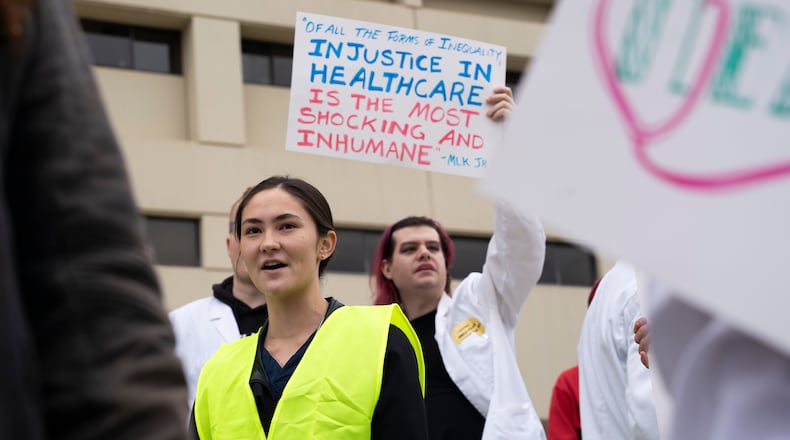Georgia faces a health care crisis, with more than 700,000 residents so far having been disenrolled from Medicaid as the government insurance program returns to pre-pandemic eligibility rules.
Hardest hit by the loss of health insurance because of this “unwinding” process are families that struggle to make ends meet, particularly children and people of color.
Georgia’s statistics are especially alarming: the state ranks third worst in the United States for removing children from Medicaid and PeachCare.
Credit: Handout
Credit: Handout
To date, 41 states and the District of Columbia have taken advantage of federal rules permitting permanent eligibility expansion, which will assist many families in those states to stay insured. Georgia is among 10 states that didn’t expand. In states that expanded Medicaid, the average income limit for a family of three this year is $35,632. In the 10 states that didn’t expand, the median income for a family of three to lose coverage is only $9,812.
Georgia’s reluctance to expand Medicaid under the Affordable Care Act is a missed opportunity to substantially alleviate the hardships faced by many of the state’s residents, particularly those who are paid too little to afford health insurance but whose income exceeds Medicaid’s eligibility limits. Expanding Medicaid would be more than a policy change. It would be a lifeline, providing coverage for an additional estimated 500,000 Georgians and bringing in billions in federal dollars, bolstering the state’s health care infrastructure and economy.
In response to the escalating crisis, the Southern Economic Advancement Project (SEAP), in partnership with the Centers for Medicare and Medicaid Services and health advocates across several Southern states, hosted Spanish-language telephone town halls to inform the public about Medicaid eligibility renewals. Nearly 4,700 Georgians participated, highlighting the community’s urgent need for information and assistance without language barriers. The sessions became a platform for families to voice their fears and challenges, such as lack of knowledge about the unwinding process, delays in Medicaid approvals and denial of services for critically ill children. These testimonials underscore the administrative inefficiencies and procedural bottlenecks that exacerbate the suffering of those most in need.
The poignant questions and stories shared in these town halls reflect a broader statewide anxiety as families grapple with the loss of essential health services. The implications of unwinding are profound. For many, losing Medicaid coverage translates into skipped medical appointments, untreated chronic conditions, and a general deterioration in health and well-being. This is especially true for children who require consistent medical attention to ensure proper development and health. The state’s failure to protect its youngest residents is not only a public health oversight but a moral failing as well.
In light of these challenges, the necessity for Medicaid expansion in Georgia has never been more apparent. By adopting Medicaid expansion, the state can secure vital health coverage for its most at-risk residents, ensuring that public health policy upholds the dignity and rights of every Georgian. The ongoing repercussions from Medicaid unwinding serve as a stark reminder that comprehensive and compassionate health care reform is essential.
Moreover, this situation demands not just temporary fixes but a sustained commitment to overhaul the Medicaid system. This involves simplifying the enrollment process, eliminating bureaucratic obstacles, and ensuring that eligibility determinations are handled swiftly and fairly. Only through such systemic reforms can Georgia ensure that no resident, especially children, is left vulnerable because of administrative inefficiencies.
As the unwinding process continues, the state’s leaders must remain focused on the families who battle to maintain their health coverage amid formidable challenges. It is a critical time for Georgia’s policymakers to step up and prioritize the health and well-being of all its residents. The call to action is clear: Expand Medicaid and reform the system to protect the health rights of every Georgian. Only then can the state begin to heal and move toward a more equitable health care future.
Genny Castillo is the deputy director of the Southern Economic Advancement Project, an initiative aimed at broadening economic power across 12 Southern states.
About the Author
Keep Reading
The Latest
Featured




